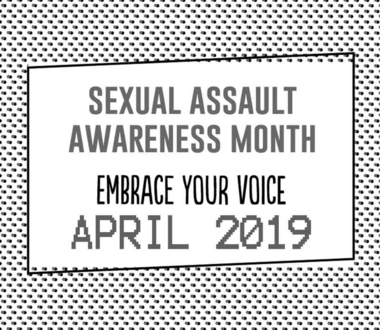April is Sexual Assault Awareness Month

by Molly Bryant
Guest Columnist
April is Sexual Assault Awareness Month. As a social worker, I am often confronted with misconceptions about the dynamics of sexual violence, so lets a take moment to dispel a few of the most commonly held myths about sexual assault.
Myth #1: Men don’t get raped: According to the Centers for Disease Control, 26 percent of gay men, 29 percent of heterosexual men, and 37 percent of bisexual men experience rape, physical violence, or stalking by an intimate partner. The consequences of perpetuating this myth are reports of high school rape getting portrayed at “hazing” incidents instead of sexual assault. Boys get raped, men get raped, non-binary folks get raped. Let’s be honest about what is happening and stop pretending their pain doesn’t exist.
Myth #2: A lot of people who report sexual assault are lying: Only 2-8 percent of rapes are falsely reported, the same rate or lower than all other felonies. If someone tells you that they’ve been sexually assaulted, and they go through the traumatic and arduous process of reporting the assault to law enforcement, they’re telling you the truth.
Myth #3: If you don’t want to get assaulted, stay away from strangers in dark alleys: Strangers are not the problem. Most sexual assaults are committed by someone the survivor knows. In fact, 55 percent of sexual assaults occur at or near the survivor’s residence, and 12 percent occur at or near the residence of a trusted friend or relative. Additionally, 60 percent of child sexual abuse survivors are assaulted by someone the child knows outside the family, and 30 percent are assaulted by family members.
Myth #4: Marital Rape: Nearly one in ten women have experienced rape by an intimate partner in their lifetime. You don’t sign away your rights to consensual sex when you sign your marriage certificate.
Myth #5: If you’re a real victim of sexual assault or rape, you will be crying and visibly upset: Everyone responds to trauma in their own way. There isn’t a singular “right” way to respond to sexual assault or rape. Survivors may cry, shut down and refuse to show emotion; they may laugh uncomfortably or be completely composed.
Myth #6: Sex workers cannot be raped in their job: People who work in the sex industry have the right to give and withhold consent to any sexual activity. They can be raped just like anyone else, and their job doesn’t negate the fact that they are living, breathing human beings with a right to consent to sex, and a right to tell someone they’re going too far.
Myth #7: Wearing a short skirt or tight pants means you’re less of a victim: A short skirt is not a “yes.” A crop top isn’t consent. No amount of clothes or style of clothes takes away your right to consent to sexual activity. Ever.
Myth #8: If you’re a real victim of sexual assault, you’ll report it to police: Rape is the least reported violent crime in the United States. There are many reasons why victims may choose not to report to law enforcement either because of fear or embarrassment, distrust of law enforcement, assumptions that they won’t be believed, concern for retaliation, or hundreds of other valid, legitimate reasons.
Myth #9: If a person is aroused when they are assaulted, then it is not really sexual assault: Orgasms can be a natural biological reaction that one can’t always control, and it definitely does not mean that the survivor wanted the assault or took pleasure from the assault. It also doesn’t mean the assault was consensual.
Myth #10: “If you hadn’t been drinking, you wouldn’t have been sexually assaulted”: Alcohol is often used as a tool to control the victim and render them helpless, but alcohol doesn’t cause rape. A rapist causes rape.
Now that we know the truth let’s start dropping it everywhere we go.
If you or someone you know is affected by domestic violence or sexual assault, please call the National Sexual Assault Hotline at 1-(800) 656-HOPE (4673) or visit www.online.rainn.org to receive support through a confidential live chat. In the Tulsa area, call DVIS at (918) 743-5763.
Molly Bryant, MSW is the Underserved Outreach Advocate at Domestic Violence Intervention Services (DVIS) in Tulsa, OK. For domestic violence or sexual assault assistance, call DVIS at (918) 743-5763.
Copyright The Gayly – April 11, 2019 @ 11:35 a.m. CDT.





